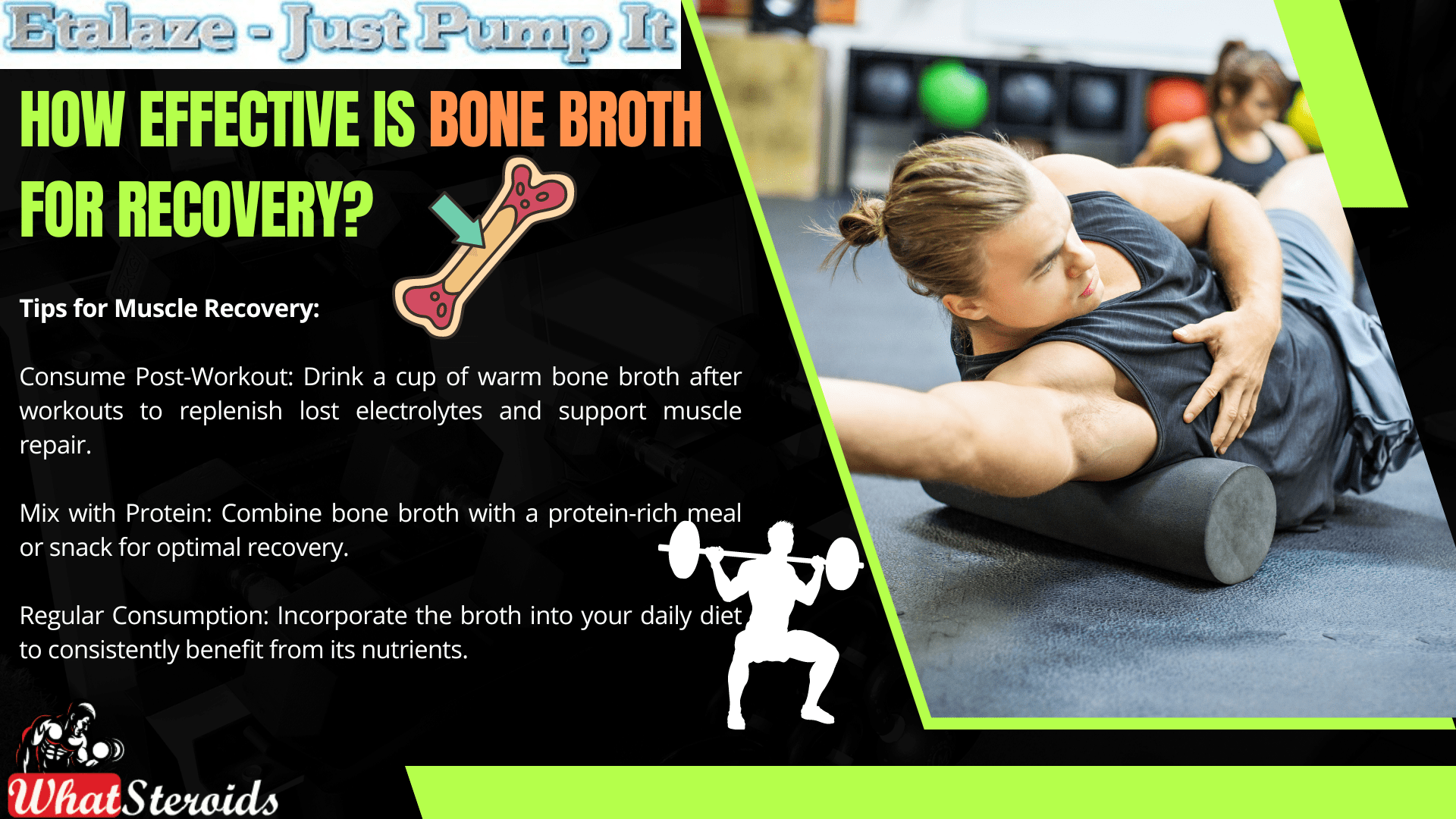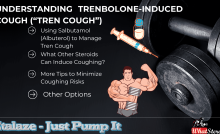How Effective is Bone Broth for Recovery?


Bone broth has gained popularity in the fitness community, including among bodybuilders, due to its potential benefits for recovery. It is a nutrient-dense liquid made by simmering animal bones and connective tissues for an extended period. This process extracts a variety of beneficial compounds and nutrients. Here's how it is effective for post-workout recovery:
1. Bone Broth is Rich in Collagen and Gelatin:
Bone broth is high in collagen, a protein that supports joint, tendon, and ligament health. Gelatin, derived from collagen, may help reduce joint pain and inflammation, which is beneficial after intense workouts.
2. Amino Acid Profile:
Bone broth contains important amino acids like glycine, proline, and glutamine. These amino acids support muscle repair and growth, immune function, and gut health—all crucial for recovery.
3. Electrolytes and Hydration:
It provides electrolytes like potassium, magnesium, and calcium, which help with hydration and muscle function. Proper hydration is key to recovery and preventing cramps or muscle fatigue.
4. Mineral Content:
Bone broth is rich in essential minerals like calcium, phosphorus, and magnesium. These minerals contribute to bone health and muscle contraction, supporting recovery.
5. Anti-Inflammatory Properties:
The nutrients in the broth may help reduce inflammation, speeding up recovery and reducing soreness after workouts.
6. Supports Gut Health:
Bone broth can help heal and maintain the gut lining, which is important for nutrient absorption and overall recovery.
Must Read: Best supplements for College students
How to Prepare Bone Broth at Home
Preparing bone broth at home is straightforward and can be customized to fit your dietary needs for muscle recovery. Here’s a step-by-step guide:
Ingredients:
- Bones: Use a mix of beef, chicken, pork, or fish bones. Marrow bones, knuckles, and joints are especially rich in collagen.
- Vegetables (optional): Carrots, celery, onions, and garlic add flavor and nutrients.
- Vinegar: 1-2 tablespoons of apple cider vinegar help draw out minerals from the bones.
- Herbs and Spices (optional): Bay leaves, thyme, rosemary, and peppercorns for added flavor.
- Water: Enough to cover the bones and vegetables.
Instructions to Prepare Bone Broth
- Prepare the Bones:
- Roasting (optional but recommended): Roast the bones in the oven at 400°F (200°C) for 30-40 minutes. This enhances the flavor of the broth.
- Place Bones in a Pot:
- Transfer the bones to a large stockpot, slow cooker, or pressure cooker.
- Add Vegetables and Vinegar:
- Add your chosen vegetables and the apple cider vinegar to the pot. Vinegar is crucial as it helps extract the minerals from the bones.
- Cover with Water:
- Add enough water to cover the bones by about 2 inches. Avoid adding too much water, as it can dilute the broth.
- Cooking Time:
- Stovetop: Bring the water to a boil, then reduce the heat to a simmer. Cook for 12-24 hours. The longer you simmer, the more nutrients you extract.
- Slow Cooker: Set on low and cook for 12-24 hours.
- Pressure Cooker: Cook on high pressure for 3-4 hours.
- Skim the Foam:
- During the first hour of cooking, you might notice some foam rising to the top. Skim it off with a spoon to keep the broth clear.
- Add Herbs and Spices (optional):
- In the last hour of cooking, add any herbs or spices for flavor.
- Strain the Broth:
- Once the broth is done, strain it through a fine-mesh sieve or cheesecloth into another pot or large container to remove the bones and vegetables.
- Cool and Store:
- Let the broth cool. You can refrigerate it for up to 5 days or freeze it in portions for longer storage.
- Use the Broth:
- You can drink the broth as-is, use it as a base for soups or stews, or incorporate it into your post-workout meals.
Tips for Muscle Recovery:
Consume Post-Workout: Drink a cup of warm bone broth after workouts to replenish lost electrolytes and support muscle repair.
Mix with Protein: Combine bone broth with a protein-rich meal or snack for optimal recovery.
Regular Consumption: Incorporate the broth into your daily diet to consistently benefit from its nutrients.
Making the broth at home allows you to control the ingredients and flavor, ensuring a nutrient-rich recovery drink tailored to your needs.
Don't Miss: Chia Seeds in A Bodybuilder’s Diet: An Expert’s Advice
Incorporating Bone Broth In Your Diet
Incorporating bone broth into your bodybuilding diet can be both delicious and beneficial. Here are some creative ways to include it:
- Post-Workout Drink: Simply heat up a cup of bone broth and drink it after your workout. It’s a great way to replenish electrolytes and protein.
- Smoothies: Add a scoop of bone broth protein powder to your post-workout smoothie. It blends well with fruits and other ingredients.
- Soups and Stews: Use bone broth as a base for soups and stews. It’s an excellent way to add flavor and nutrients to your meals.
- Cooking Grains: Cook your rice, quinoa, or other grains in the broth instead of water. This enhances the flavor and nutritional content.
- Sauces and Gravies: Incorporate bone broth into sauces and gravies for added depth of flavor and health benefits.
- Marinades: Use bone broth as a base for marinades for meats and vegetables. It adds a rich flavor and helps tenderize the meat.
- Bone Broth Ice Cubes: Freeze bone broth in ice cube trays and add the cubes to your dishes as needed. This is a convenient way to add a nutritional boost to any meal.
- Bone Broth Tea: Mix bone broth with herbs and spices to create a savory tea. This can be a soothing and nutritious drink.
These methods can help you enjoy the benefits of bone broth while keeping your diet varied and interesting. Have you tried any of these methods before?
Which Animal's Bones Give the Best Broth?
Different animal bones can be used to make broth, each offering unique benefits for bodybuilding recovery. Here are some of the best options:
Beef Bones: Beef bones, especially marrow bones, knuckles, and joints, are rich in collagen and gelatin, which support joint health and muscle recovery. They also provide a deep, rich flavor and are packed with minerals like calcium and magnesium.
Chicken Bones: Chicken bones, particularly those from the feet and wings, are high in collagen and gelatin. Chicken broth is lighter in flavor but still rich in nutrients that aid in muscle repair and joint health.
Fish Bones: Fish bones, especially from oily fish like salmon, are excellent for a lighter broth that is rich in omega-3 fatty acids. These fatty acids have anti-inflammatory properties, which can help reduce muscle soreness and promote recovery.
Pork Bones: Pork bones, including the feet and hocks, are also good sources of collagen and gelatin. They produce a flavorful broth that can support joint and muscle health.
Lamb Bones: Lamb bones are another great option, providing a rich, flavorful broth that is high in collagen and minerals.
Each type of bone broth has its own unique flavor and nutritional profile, so you might want to try different ones to see which you prefer and which best supports your recovery needs.
Related Article: Essential Techniques to Master Squats Form
Overall
Can I use bone broth while on steroids? Yes, bone broth can be beneficial for bodybuilders who are using steroids or other supplements, as it provides essential nutrients that support overall health and recovery. Steroids and other performance-enhancing drugs often place additional stress on the body, particularly on the liver, kidneys, joints, and connective tissues. As mentioned, bone broth is rich in collagen, gelatin, amino acids like glycine and proline, and minerals such as calcium and magnesium, which help support joint health, reduce inflammation, and promote gut health. These benefits are especially important for bodybuilders using steroids, as these drugs can sometimes exacerbate joint pain, weaken connective tissues, or cause digestive issues.
Additionally, bone broth can help with hydration and provide electrolytes, supporting muscle function and recovery. While it shouldn't replace other key nutrients and should be used alongside a well-rounded diet and supplement regimen, bone broth can serve as a natural, nutrient-dense addition that helps mitigate some of the side effects of steroid use and enhances overall recovery and performance.
Recent Posts
Decoding IGF-1 LR3: A Comprehensive Guide to its Benefits
IGF-1 LR3 (Insulin-like Growth Factor-1 Long Arg3) is a synthetic variant of IGF-1, a hormone…
AOD-9604: The Fat-Burning Peptide Explained
AOD-9604, along with the similar HGH Frag 176-191, is a peptide derived from Growth Hormone…
Understanding Trenbolone-Induced Cough (“Tren Cough”)
Trenbolone, a potent anabolic steroid, can sometimes cause “tren cough”—a sudden and intense coughing episode…
Creatine vs Myostatin: An Expert’s Analysis
Myostatin, a protein encoded by the MSTN gene, acts as a regulator of muscle growth.…
Raloxifene (Evista) 101: A Non-Surgical Solution for Gyno
Raloxifene, a selective estrogen receptor modulator (SERM), is one of the most valuable yet less…
Mastering Bodybuilding in 2025: Top Fitness Tips for Success
Bodybuilding is more than just a sport; it's a lifestyle that requires dedication, discipline, and…


